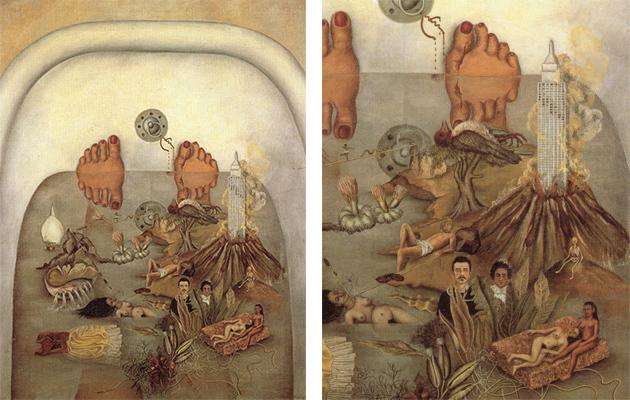The film Dead Poets Society (dead poets society, in English) is a feature film in the drama genre that was released in 1990.
Scripted by Tom Schulman and directed by Peter Weir, this work was one of the greatest milestones in cinema in the 90s and received several awards and nominations.
Check out the summary and analysis of the film below, as well as some important reflections and questions about the feature film.
Summary of the movie “Society of Dead Poets”
With a linear and chronological narrative, the story of the film takes place in the fall of 1959 in an elite prep school for boys, the Welton Academy.
This study center, located in the United States, was guided by 4 basic principles: tradition, honor, discipline and excellence.
With the arrival of the new English and Literature teacher, John Keating, the students' routine began to change, as their teaching method was very different and untraditional.
Through poetry, Keating inspires his students and introduces them to the society he founded when he was a student at Welton: The Society of Dead Poets.
Thus, with less conservative methods, he is teaching literature, winning over his students and encouraging them to live in an extraordinary way. One of the first concepts used by the teacher is the carpe diem, which means "enjoy the day, the moment”. In his words:
Carpe diem. Enjoy the day, boys. Make your lives extraordinary.
With this, Keating introduces the concept of finitude and, therefore, tells students that they must live each moment intensely and prioritize their ideas and desires, because after all, everything has an end.
One of the memorable scenes in the movie is when the teacher stands at the classroom table inviting everyone to do the same. That's because being taller, the perspective changes. In his words:
The world looks very different from up here.
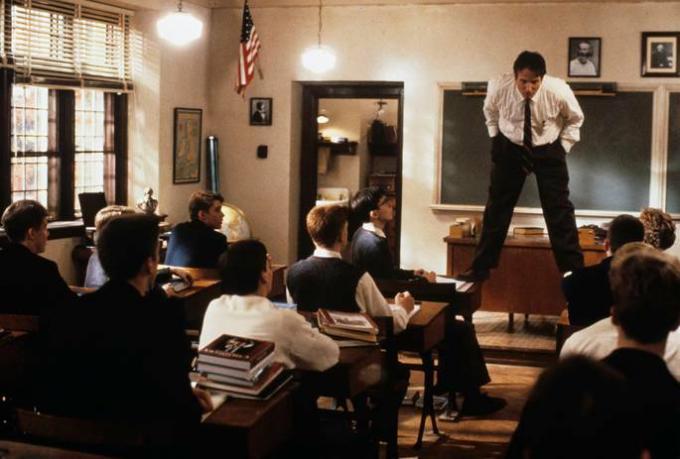
In addition, he proposes the production of poems that focus on each person's life. This task drives the expansion of students' ideas, who were inserted in that rigid and authoritarian environment.
Certainly, Keating is conquering his students and making them prioritize their choices, see the beauty of life, and don't get carried away by the ways chosen as “right” to live.
Fascinated by the professor's ideas, one of the finalists, Neil Perry, starts a secret club where he and other students recite poetry in a cave near campus.
Little by little, Neil discovers his love for the theater and lands a role in a local play “A Midsummer Night's Dream”. However, his father, very traditionalist, conservative and strict, wants him to become a doctor.
Therefore, the moment he learns of Neil's intention and choice for dramatic art, he forbids him to perform. However, in the presentation, the father ends up appearing.
Disillusioned with his father's position and the future that awaits him, Neil commits suicide. This, without a doubt, is the highest point in history, which will have negative consequences for the new teacher.
So, due to Neil's death and his unorthodox and unrigid way of teaching, he ends up being targeted by other teachers and the school principal, Norman Lloyd.
Eventually, John Keating is fired by Mr. Nolan, which leaves his students sad and disillusioned.
When the teacher appears in the classroom to collect his belongings, the students pay tribute to him by climbing up on their desks in the classroom, as he had taught them.
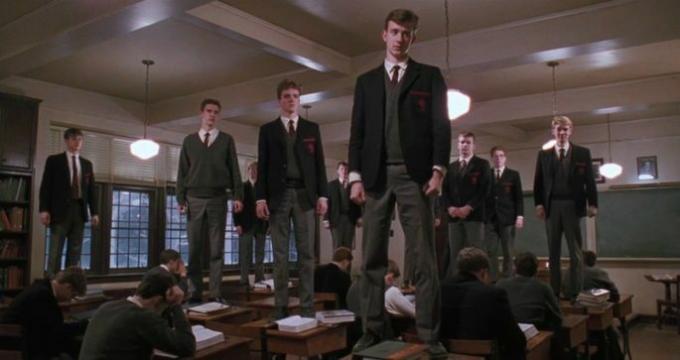
The end of the film shows that the experiences lived with the teacher had a great impact on everyone's life and will never be forgotten by the students.
Critical analysis of the film “Society of dead poets”
THE Dead Poets Society presents a strong criticism of the traditional teaching model of the time, which prioritized rigidity and inflexibility. Thus, the school environment is castrating, hermetic and reprehensible to all students.
It is a portrait of the bourgeois society of the time, where traditionalism was still very present. The attempt to transform the world at the turn of the decade is encouraged by the new teacher's innovative ideas which, in this context, are a metaphor for change or even for what is needed to change.
Students at the center were fascinated by the possibility of being critical and independent thinking encouraged by the new member of the school.
In this way, the teacher represents the hope of being able to live fully with their own choices. For him, we should not see the world as people want, but find our own voices.
Most men live their lives in quiet despair. Don't get carried away by it. React!
One example is Neil's encounter with dramatic art. He discovers his passion and ends up being the target of the rigidity and inflexibility of his father, who forbids him to follow his path, which results in the tragic suicide of his son.
Alongside many figures, the school principal represents the traditionalism and conservatism that resists the changes brought about by the founder of the society of dead poets, Professor Keating.
Some reflections on the film “Society of Dead Poets”
Many points in the film can generate interesting and up-to-date reflections in the classroom. This is because many teachers use this film as a task at school.
For this reason, it is worth mentioning here some that can also be themes for university entrance exams, Enem, or even for the essay.
1. The teacher and student relationship
The relationships between teacher and student can happen horizontally or vertically. In the first case, there is not a very prominent hierarchy between the figure of the teacher and the students.
In the second, students are seen as a repository of knowledge, not having a critical and dialogic view.
In the film, the vertical relationship is highlighted between most teachers and students. This is modified with the arrival of the new teacher who treats his students as equals, creating a less hierarchical and horizontal relationship.
2. Authoritarianism and rigidity
Typical of more traditional societies, authoritarianism emerges as a way to control the people who form a community. For this, several rules of conduct are imposed that prioritize rigidity.
In the film, it is possible to find several examples of the authoritarianism imposed by the teachers and director, and also the rigidity of the school's methods.
3. the pursuit of happiness
The pursuit of happiness involves discovering your own being and what makes you really happy without sabotaging your desires.
In the film, the new teacher proposes that students seek and find their true forms of happiness, that they expand their horizons and see the world from another perspective.
All this so that happiness is not imposed and chosen by others, which leads to false happiness.
4. The concept of Carpe Diem and finitude
Carpe diem, which means "enjoy the present moment; enjoy life” is a Latin phrase that was used in the work of the Roman poet and philosopher, Horace.
This concept was also used extensively in the 18th century, in the literary movement of Arcadianism.
In the film, this expression is used by the teacher emphasizing the importance of fully living the present moment. In addition, he addresses the idea of the finitude of life, since everything has an end and, therefore, we must enjoy life to the full.
5. critical thinking
The search for critical thinking is one of the main points addressed by the film. The study center's molds follow a hermetic, traditionalist and predetermined posture.
Teaching itself, permeated by memorization and repetition, makes students less critical. This posture is undoubtedly touched upon by the new teacher, who has a teaching pedagogy at all. conventional and is intended to allow its students to think for themselves and create their own opinions.
6. The importance of reading
Learning to read the world is one of the concepts that is related to improving perceptions as well as creating critical thinking.
Reading has the power to make us see things that we had not noticed before, that is, it leads us to reflect on some issues. In addition, it arouses emotion and feelings, while helping to improve our vocabulary.
In the film, reading is a strong point and much explored by the new teacher. His literature classes lead students to realize the beauty of words and their importance for self-understanding.
7. The transforming power of art
The arts provide a better perception of life, awakening relevant emotions and reflections. Contact with various artistic manifestations can transform and sharpen some senses, thus playing a fundamental role in education.
In the film, poetic art is used by the literature teacher with the aim of inciting reflections in his students. It is through art that everyone's worldview expands, which leads students to re-create a kind of poetry club. There, they end up being inspired and discovering different facets.
8. The importance of professional choice
Allied to the idea of happiness, professional choice plays a preponderant role that helps in the feeling of professional fulfillment.
We work a large part of our lives and if it takes time, we will run out of energy and in poor health. Therefore, it is essential to know yourself and know how to choose the best way to feel good and fulfilled.
In the film, one of the students discovers his love for the theater, however, his father wants him to follow the profession of doctor, much in demand and well regarded until today.
Questions about the movie “Society of Dead Poets”
question 1
About the film Society of Dead Poets it is correct to say:
a) Professor Keating teaches his students to be disciplined and to follow the professions of doctor, engineering and law.
b) The center's director, Mr. Nolan, was Keating's childhood friend and therefore shares his tastes and ambitions.
c) Neil and his colleagues create a secret literary club to share ideas and recite poetry.
d) The name of the film “Society of Dead Poets” refers to the Greek poets who were killed in battle.
e) Neil's father, Mr. Perry, is very kind and understanding to his son, allowing him to choose his path.
Correct alternative: c) Neil and his colleagues create a secret literary club to share ideas and recite poetry.
After becoming interested in the Society founded by Professor Keating when he was a high school student, Neil and his colleagues re-create this literary club. So they flee the campus and find themselves in a cave to recite poetry and talk about life.
About the other alternatives:
a) WRONG. Professor Keating has an innovative approach and allows his students to be critical and think for themselves.
b) WRONG. The director, Mr. Nolan, was not Keating's friend in childhood and has an opposite posture to Professor Keating, that is, rigid and traditional.
d) WRONG. The name of the film refers to the society created by Professor Keating, even when he was a student at that preparatory school.
e) WRONG. Neil's father, Mr. Perry, is a person with a very rigid and inflexible personality, which prevents his son from being an actor.
question 2
For the film Society of Dead Poets, check the INCORRECT alternative:
a) Welton Academy was a male-only prep school.
b) Students call Professor Keating “My Captain”.
c) The center's principles were in line with its educational proposal.
d) The school prepared students to follow more traditional careers.
e) Carpe diem was one of the main mottos of the school.
Correct alternative: e) Carpe diem was one of the main mottos of the school.
carpe diem is a Latin phrase meaning “seize the present moment” and was introduced by newcomer literature professor John Keating.
Welton Academy was guided by 4 basic principles that were aligned with the school's proposal: tradition, honor, discipline and excellence.
The students who lived there were part of the upper class of society at the time. They followed strict rules and were prepared to win places at renowned universities. Professions considered traditional were the most sought after, such as medicine and law.
Keating's students called him “Captain”, as this was one of the excerpts from Walt Whitman's poem quoted in the classroom by the teacher himself.
question 3
(UPE) The film Society of Dead Poets rescues two important artistic moments: Arcadism and Romanticism. Look at the two images from the movie and analyze the propositions below, putting V in the true ones and F in the false ones.
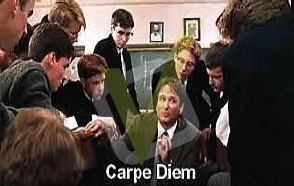
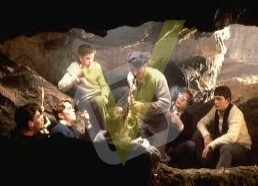
( ) The film begins with the arrival of the Literature teacher at a college, being conducted by rigorous and traditional methods. The new teacher, a former student at the school, starts using a special pedagogy, aiming to break with the traditional formalism, which makes him different from all other colleagues.
( ) The Latin expression Carpe Diem, which means “enjoy the day”, present in the first image, together with the second, characterize Arcadianism. The expression becomes the greeting of Professor Keating's students, while the second image can be understood as Arcadia, a space where poets gathered to hold discussions and present their productions.
( ) Students start to like the new method and become friends with the teacher, who guides them, among other things, to fight for their goals, which leads to disagreement between students and parents. One of them flatly refuses to accept his son's professional choice, but this is irrelevant to the story, because the feeling of freedom, characteristic of Romanticism, overcomes all obstacles, with the film having an outcome happy.
( ) The film's ending shows that personal fulfillment always materializes, as long as one struggles to obtain it. So Neil, who wanted to be an actor, even without his father's permission, breaks with customs, confronts his father and ends up embracing the profession. Years later, he receives his father's forgiveness, which characterizes the supremacy of emotion, typical of Romanticism.
( ) At the end of the story, the teacher is able to completely change the traditional method of working with Literature, but does not remain at Weliton Academy, being fired, and students do not react to the departure of their Captain, so called by they.
Check the alternative that indicates the CORRECT sequence.
a) V - V - F - F - F
b) V – F – F – V – F
c) F – F – V – V – V
d) F – F – F – V – V
e) F – F – V – V – F
Correct alternative: a) V – V – F – F – F
1st proposition is true: The newcomer teacher uses a very different and untraditional method from his peers. His classes are examples that his methodology breaks with the formal and rigid standards imposed by the center.
2nd proposition is true: Arcadism was a literary movement that emerged in Europe in the 18th century. The literary societies of the time were called Arcadias. There, writers gathered to discuss literature. In addition to Carpe Diem (seize the moment), other Latin expressions were used: Fugere Urbem (to escape the city); Inutilia Truncat (cut the useless), Aurea Mediocrites (Golden mediocrity/common life) and Locus Amoenus (gentle/pleasant refuge).
3rd proposition is false: Although the students become friends with the teacher, this relationship ends up triggering the suicide of one of them, Neil Perry. That's because he finds his passion in drama, but is prevented by being a father from fulfilling his dream.
4th proposition is false: In a traditional society like the one in the film, there are many obstacles that prevent people from realizing their dreams and following their lives as they intend. Although Neil finds his dream profession, his father, who wants him to become a doctor, prevents him from following his passion for the theater.
5th proposition is false: At the end of the film, the teacher is fired, however, this saddens his students a lot who, for Finally, they pay tribute to him emphasizing that his presence was very important and will never be forgotten.
Cast of the movie “Society of Dead Poets”
Below are some of the main characters in the story:
- John Keating (Robin Williams) - alumnus of the school and professor of literature
- Mr. Nolan (Norman Lloyd) - principal of the Welton Academy school
- Neil Perry (Robert Sean Leonard) - student who commits suicide
- Mr. Perry (Kurtwood Smith) - Neil's father
- Mrs. Perry (Carla Belve) - Neil's mother
- Knox Overstreet (Josh Charles) - Neil's student and roommate
- Todd Anderson (Ethan Hawke) - student
- Charlie Dalton (Gale Hansen) - student
- Stephen Meeks Jr. (Allelon Ruggiero) - student
- Richard Cameron (Dylan Kussman) - student
- Gerard Pitts (James Waterston) - student
- McAllister (Leon Pownall) - Latin teacher
Book “Society of Dead Poets”
Based on the film, American writer and journalist Nancy H. Kleinbaum, published the book Dead Poets Society in 1991.



